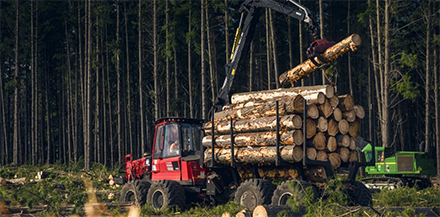A landmark Green Triangle study into plantation water use is underway in an effort to regain access to state-controlled water and stop the growing loss of forestry estate in South Australia. Source: Timberbiz
Over the past five years more than 30,000 hectares of plantation has not been replanted in the south east because of water licensing restrictions placed on industry by the Lower Limestone Coast Water Allocation Plan (WAP).
These bans on replanting have wiped more than $350 million worth of economic activity from the local economy, threatening the livelihood of some silviculture operations and forcing forest growers to investigate alternative markets interstate.
Green Triangle processor Ian McDonnell, director of NF McDonnell and Sons, said the Green Triangle was now Australia’s largest softwood plantation estate with growing opportunity to deliver the bulk of the nation’s timber needs, given the loss of significant estate as a result of devastating summer bushfires.
Mr McDonnell, who is also chair of the GTFIH, said the Federal Government had announced a national plan of planting an additional One Billion plantation trees over the next decade, with the GT committing to delivering 20% of this target.
“The Commonwealth target is a tremendous opportunity for our local community to realise new industry growth, strengthening our manufacturing base and building our workforce. However, the WAP is preventing growth, in fact it is resulting in a net reduction of plantation area,” he said.
“Already we have lost 20,000 hectares over the past five years with more land to be lost in the near future. This is the equivalent of assets lost in the 1983 Ash Wednesday bushfires. The difference then was that we had the ability to replant and rebuild our sector. Today we stand at a stalemate with land remaining cleared, uncertain whether plantations will ever be re-established.
“Sadly, these water management decisions are based on science and data which is almost two decades out of date and simply irrelevant in the current climate. This is why our sector is investing in an extensive research plan using the best scientific researchers to put the full facts on the table to ensure fair and equitable decision making can be achieved for all water users in the 2023 water review.”
In partnership with UniSA, guided by Forest Research Mt Gambier, researchers are developing a full evidence base on plantation water use, building on the recommendations from the Goyder Institute independent review from 2019.
Research includes investigating groundwater resource management to better understand groundwater triggers, recharge rates, specific yield and porosity to the aquifer. Work extends to examining the direct impact of plantation forests on wetlands, understanding the role of climate change and existing water events, and the role of heavy clays to understand plantation areas that may not be accessing ground water.
This work builds on the extensive research already being undertaken by NIFPI (National Institute of Forest Products Innovation) over the past 12 months, which includes tree water use measurement for ground truthing, remote sensing of tree water use, to provide a full understanding of ground water impacts and management of wetlands in plantation forests.
Mr McDonnell said the research was expected to be finished later this year.
“Our forest and timber sector are investment ready with hundreds of millions of capital works earmarked or already underway which will provide huge growth opportunities for our community; however, it is reliant on this state water plan being actively reviewed to provide long-term water security,” he said.
“This extensive peer reviewed research, which is the first of its kind ever undertaken for the forest sector, will aid this WAP review process. Significant time, resources and investment is being spent to provide a robust evidence base on the truth of plantation water use. This will allow industry to work proactively with government and other key stakeholders to attract fair and equitable access to water for all industries.”






